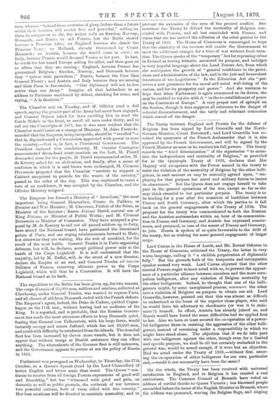Lord Cairns in the House of Lords, and Mr. Bernal
Osborne in the House of Commons, criticized the Treaty, the latter in very warm language, calling it "a childish perpetration of diplomatic folly." But the grounds both of the temperate and intemperate speaker seemed very weak. Lord Cairns objected that the other neutral Powers ought to have acted with us, to prevent the appear- ance of a particular alliance between ourselves and the more scru- pulous belligerent, after any violation of Belgian neutrality by the other belligerent. Indeed, he thought that one of the belli- gerents might, by some unexplained process, manouvre the other into a violation of Belgium on purpose to obtain our aid. Lord Granville, however, pointed out that this was almost as difficult to understand as the boast of the superior chess-player, who said he would force his adversary to checkmate (or was it to stale- mate ?) himself. In effect, Austria has already joined us, and Russia would have found the same difficulties had we applied first to her. Also we have at least secured the co-operation of a power- ful belligerent State in resisting the aggression of the other belli- gerent, instead of remaining under a responsibility in which we might have stood alone. The objection that if we do take part with one belligerent against the other, though even for a limited and specific purpose, we shall be all but certainly embarked in the general war, would be sound enough, if it were but an objection. Had we acted under the Treaty of 1839,—without first secur- ing the co-operation of either belligerent for our own particular end,—would it not necessarily have been the same?






























 Previous page
Previous page